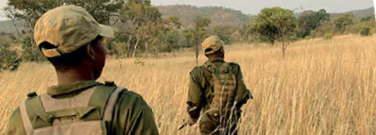Female Wildlife Rangers: Empowered to Protect the Planet

By Dani Lewis
Right now, over a million animal species are threatened with extinction—that’s almost half of all species on Earth.
But just like mama bears protect their cubs in danger, women are banding together to protect endangered animals. There is a growing number of all-female wildlife ranger teams who dedicate their lives to protecting biodiversity, according to the National Geographic article “Female Wildlife Rangers.” These women work tirelessly to achieve two main goals: defend endangered animals from poachers and empower communities with knowledge of conservation.
The Brave Ones
Becoming a wildlife ranger demands exceptional strength for difficult and potentially dangerous missions. Traditionally, women have not been viewed as suitable rangers in many communities. “In Africa, being a ranger was a job meant only for a man and not a woman, as we women were seen and taken as the weakest people. Our job was only to be home, give birth to children, cook, wash, go to the fields, and do all house chores,” said Vimbai Kumire, an Akashinga sergeant and single mom of two, according to the Daughters for Earth article “Meet the Akashinga” by Lindsey Jean Schueman.
Despite these traditional viewpoints, brave women choose to devote their time to protecting endangered animals as wildlife rangers. They endure rigorous training to prepare for treacherous tasks. From meeting poachers head on to carrying out sting operations, they are equipped to do what it takes to protect animals.
Community-Led Success
The Black Mambas were organized as the first fully female anti-poaching unit in the world. Their organization is passionate about wildlife conservation in Greater Kruger National Park, an area where rhino poaching is more devastating than anywhere else. These women walk over 12 miles a day and collectively patrol almost 50,000 acres across South Africa. The Black Mambas have recorded that poaching has been reduced by 63 percent in the area where they operate.
Many other female ranger units like the Akashinga—an all-women anti-poaching unit in Zimbabwe—have found success through educating their local communities about the importance of conservation. This approach is encouraged by the International Anti-Poaching Foundation, as stated on its website: “If a community understands the economic benefits of preserving animals, then it will eliminate poaching without an armed struggle.”
Women wildlife rangers prove their job is most effective when compassion for community works in conjunction with vigilant defense.
The Future Is Female
The growing support of female wildlife rangers impacts the lives of rangers themselves and their surrounding community members. With these jobs, women rangers can support their families, access healthcare, and continue their education.
“Usually, men are the first preference to be employed by companies. But now I have the respect of my community, and I will be able to build my children’s future,” Sithabile Munenge, community scout for the National Park Rescue in Zimbabwe, explained in the National Geographic article.
Female wildlife rangers make a difference in our world—both in the lives of people and animals.
You can celebrate the success of these women by participating in Female Ranger Week events organized each June by How Many Elephants.
Photo: Holly Budge
Discussion Questions
- How can communities support women wildlife rangers on a local and global level?
- What other professions were traditionally seen as only suitable for men? How is this perspective changing across the world?

